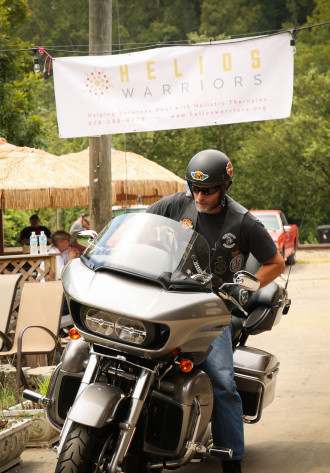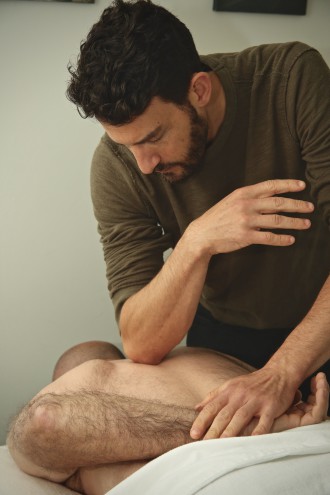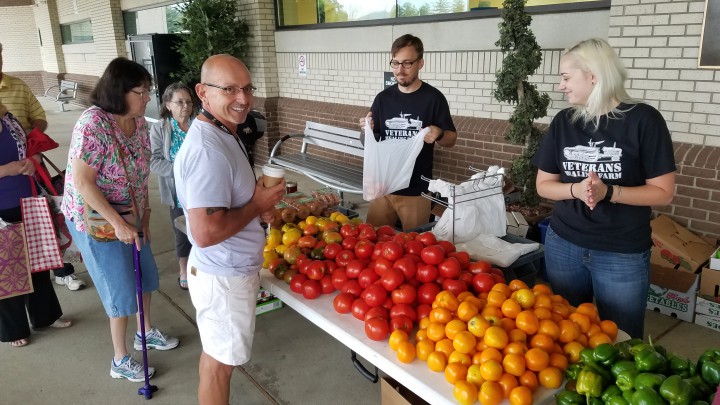With Veterans Day fast approaching, the customary forms of American celebration will be prominently on display: parades through city streets, moments of silence briefly interrupting broadcast media, solemn ceremonies at landmarks across the country, special discounts at restaurants and shops. Beyond those symbolic gestures, however, stands a large and growing need to support the many veterans who are struggling with serious physical and emotional issues or with trying to re-establish themselves in civilian society.
A 2015 report by the N.C. Bar Association found that 18.5 percent of the state’s veterans reported suffering from post-traumatic stress disorder. According to the Veterans Healing Initiative, a national nonprofit, substance abuse disorders are one of the top three diagnoses in the Veterans Affairs system nationwide, and an estimated 18 veterans commit suicide every day. Nearly 20,000 vets live in Buncombe County alone, census data show.
But Western North Carolina is also home to various nonprofits and support networks that are digging deeper, working to meet these pressing needs in creative ways while fostering a sense of community and support for those who’ve given their time, and often risked their lives, in defense of this country.
Rough landing
While the rigors of combat and its associated traumas are widely recognized today, the return to a “normal” life outside the military can be just as painful and isolating, says Air Force veteran John Mahshie.
“The military has two very distinct components, which are not easily replicated in the civilian world,” he notes. “One is the community factor. They essentially share this common identity, regardless of a person’s political preference, religious beliefs or socio-economic background. When we transition into the civilian world, it’s totally different — community is much more cliquish and static. To break into that is very difficult.”
At the Veterans Healing Farm, which Mahshie founded in Henderson County in 2013, the core mission is preventing suicides. “When you think of a veteran who’s homeless or [experiencing] substance abuse or divorce, this is a form of suicide,” Mahshie asserts. “But most people don’t realize that a majority of the veterans who actually physically take their own lives were not combat veterans: 16 percent more noncombat veterans are committing physical suicide.”
Uncertainty, he continues, looms large in this equation. “The military has a very clearly defined mission; they’ve essentially prepared you and provided you all the tools needed to carry out that mission. When individuals leave the military, they now have to answer [those] questions [for themselves]. That space, and the facilitation of that self-awareness, is a very difficult struggle.”
Forging a new identity

Air Force veteran Melissa Jackson echoes Mahshie’s sentiments. “I came from a military family with a service history that dates back at least to World War I,” she says. Since her discharge in 1982, she’s struggled with PTSD and substance abuse, eventually landing in Asheville to seek services at the Charles George VA Medical Center. Through the Asheville Buncombe Community Christian Ministry, she found a home at Steadfast House, a shelter for female veterans.
“The transition is difficult, because civilians don’t understand the bond that military personnel share,” notes Jackson. “We miss that sense of belonging; we need the community to be patient and to help us transition.”
Even when help is supposedly available, trying to access needed services through an overburdened bureaucratic system can be discouraging, says nine-year Army veteran Mike Gillis. “There always seems to be some loophole,” he observes. “In some cases, it seems like the government forgets soldiers who served honestly, with bravery and commitment.”
“Many veterans suffer from physical, emotional and spiritual traumas related to their military service,” agrees Marsha Bennett, a Gulf War veteran who’s now the executive director of Helios Warriors. “Unfortunately, they and their families aren’t given the tools to help them overcome this trauma. Our veterans and their families often feel they’ve been pushed aside after they’ve given the best of themselves to defend our way of life.”
It’s up to the community as a whole, she maintains, to combat these feelings of abandonment. “As with most issues that affect people in our country, the government isn’t going to fix it for us. The responsibility lies with all of us to make our communities and our world a better place, and we can do that by focusing on healing our veterans, one wounded warrior at a time.”
Boots on the ground
Individually and in partnership, local organizations are tackling different aspects of what our veterans need.
ABCCM focuses on combating homelessness and helping former servicemen and women obtain job skills and permanent housing, says the Rev. Scott Rogers, the organization’s executive director. “Since we opened the Veterans Restoration Quarters and Steadfast House in 2008, we’ve had less than 10 unsheltered veterans at any one time,” he proudly reports. “Everybody’s doing their part toward getting every veteran off the streets and keeping them off.” Last year, the two facilities sheltered 490 homeless vets. And 18 months after leaving the shelters, 85 percent of those served are still sober and have homes and jobs, the nonprofit notes.

ABCCM’s program offers a variety of life-skill classes and job-training programs in some of the area’s fastest-growing industries, says Rogers, such as health care, restaurants and information technologies. The nonprofit has also partnered with other local groups to help veterans deal with legal issues and receive benefits through the Department of Veterans Affairs.
In addition, two new housing projects are in the works. “One for men, called Veterans Village, and another project specifically for women, Transformation Village, where they can bring their children,” he explains. “We’re waiting on permits right now, but if we can get those through, we’ll actually move dirt before the end of the year.” Altogether, the two complexes will offer 150 additional beds for local veterans.
Still, the need remains great. “About 70 percent of the veterans we have at the Veterans Restoration Quarters and Steadfast House are actively using mental health services available at the VA,” reports Jessica Whitehill, the nonprofit’s director of marketing and communications.
Re-establishing connections
At Helios Warriors, an Asheville-based nonprofit, a team of local practitioners offers a wide variety of holistic therapies to supplement the traditional treatments for PTSD, physical pain and emotional trauma, all on a sliding scale. “Our veterans and caregivers pay between $5 and $50 for high-quality holistic therapies in a safe and supportive environment, and our clients are never turned away for inability to pay,” Bennett notes, stressing that her nonprofit specifically chose to include veterans’ families in its healing mission.
“Not only veterans are affected by their experiences in defense of our country,” she points out. “Their friends and families are being torn apart as well. If we can heal our veterans and give them the tools to overcome the physical, emotional and spiritual traumas of their military service, we can begin the process of healing our communities.”
The Veterans Healing Farm uses the shared experience of operating a working farm to rebuild the sense of community that’s often lost once a veteran leaves active service.
This year, the nonprofit also partnered with the local VA Hospital to create a 1-acre community garden that produced over 8,000 pounds of organic produce. Mahshie says the bounty was distributed weekly to veterans being treated at the hospital. “People were just champing at the bit from this idea of having something real that provides real substance,” he recalls. “To have a grown military man weeping about how impactful this was for him is extremely powerful.”
In addition, Mahshie and his team are now putting the finishing touches on a new community center. He hopes to host a series of workshops there introducing vets from around the country to his organization’s work, so they can implement the model in their own communities.
“It’ll be the Joshua McArdle Community Center, named in honor of a local veteran who took his own life,” Mahshie reveals. “Our goal is to, free of charge, put veterans through a one-week boot camp, training them in the techniques needed to replicate our model. We’ll be live-streaming all of our workshops and putting it on a website where it’s all going to be available for free.”

From the heart
Much remains to be done to address local veterans’ mental and physical needs. But Jackson, for one, sees the area’s strong sense of community as the perfect starting point for achieving broader goals. “On behalf of my fellow Asheville veterans, I’d like to thank this kind and generous community,” she declares. “They have certainly opened their hearts to me and made my life so much better!”
More specifically, says Rogers, “We really need people in the community to consider investing in training or scholarships, work clothes and the materials veterans need to improve their skills.”
That’s particularly true in the case of small nonprofits like Helios Warriors, notes Bennett. “We rely heavily on community support to provide our services,” she emphasizes, asking anyone interested in donating time or money to visit the website and sign up (see box).
But while volunteers, jobs and housing support are always needed, helping veterans get back on track can be as simple as opening one’s heart and reaching out to those who’ve served our country so selflessly, says Mahshie. “From my perspective, the No. 1 thing is being empathetic. When you walk by another person on the street, it’s commonplace to say, ‘How’s it going?’ It’s a superficial question, and yet it’s so important.”
“Freedom comes at a price,” stresses Gillis, the Army veteran. “Loss of life is the retail value. … American fighting men and women stationed overseas are paying that monthly payment. Seek out homeless veterans, find the ones who crave a better life, give every reasonable assistance to bring them to the level of respectability and pride. They’re still American soldiers.”




The Veteran Restoration Quarters in Asheville, NC is tops on helping veterans such a I being homeless and paying for a room at the Quarters. If not for the Quarters, I would be out on the streets. Been there, done that, didn’t care for it. Only downfall is being profiled as an alcoholic and/or drug addict.